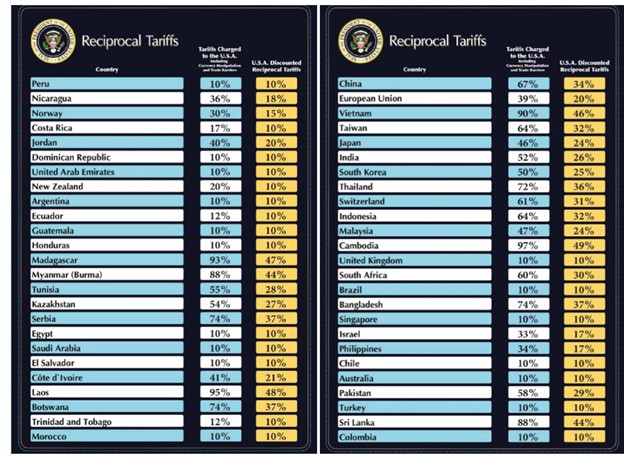
In April 2025, US President Donald Trump announced the introduction of a new package of so-called “retaliatory tariffs” on imports of goods from a number of countries, including China. According to the White House, the base rate was 10% for all imported goods, but for some countries, such as China, a higher rate of 34% was set. Soon after, China announced symmetrical measures: mirror duties on American products in a similar amount and also filed a formal complaint with the World Trade Organization (WTO), pointing out a direct violation of the fundamental rules of international trade.
This event caused concern not only among economists and analysts, but also among the international business community. Such measures do not lead to a resolution of trade disagreements, but to their aggravation and can have long-term negative consequences for the global economy.
Historical Parallels: Lessons from Unlearned History
Protectionism in trade policy has never produced sustainable results. One of the most famous examples is the American Smoot-Hawley Act of 1930. The tariffs imposed at that time triggered a chain reaction of retaliatory measures from US trading partners and led to a dramatic decline in global trade, worsening the Great Depression.
Modern economists in 2025 draw parallels between Washington’s actions today and those historical events. Higher tariffs tend to make products more expensive, reduce business activity, slow economic growth, and weaken global supply chains.
Crisis of Confidence in the Multilateral Trading System
The introduction of new tariffs by the United States not only violates bilateral trade agreements but also undermines the established principles of the World Trade Organization, which for decades has served as a platform for settling disputes and promoting free trade. As WTO representatives noted in a recent statement, these steps by the United States could reduce the volume of world trade by 1% as early as 2025.
The complaint filed by China to the WTO not only demonstrates its determination to defend its interests in the legal field, but also highlights the growing tensions between the two largest economies in the world. Against the backdrop of geopolitical fragmentation, this could trigger a new wave of trade escalation, in which third countries are also drawn in.
Kazakhstan, as a country with an open and export-oriented economy, is sensitive to the stability of the global trading system. The consequences of trade wars can affect the country in several ways, for example, in the event of an economic slowdown in China caused by the tariff burden, demand for raw materials may decrease, which will lead to a drop in Kazakhstan’s export revenue. Kazakhstan is actively developing as a transit link between China and Europe. If trade volumes decrease, this will hit the efficiency and profitability of infrastructure projects within the framework of the “One Belt, One Road” initiative.
Amid global instability, investors tend to retreat to “safe havens” such as the dollar or gold, which can lead to a weakening of the tenge.
Other developing countries, such as India, Vietnam, Brazil and Turkey, will also come under pressure. The growth of trade barriers will force their manufacturers to reconsider supply chains and seek new markets. In addition, the growing unpredictability of US policies may prompt other countries to strengthen regional trading blocs and switch to settlements in national currencies in order to reduce dependence on the dollar system.
There is only one way out – cooperation and dialogue
The United States, as the world’s largest economy, bears a special responsibility for maintaining the stability of the global trading system. Unilateral protectionist measures undermine not only international norms, but also trust in the United States as an economic partner.
The path to resolving contradictions lies not through increasing tariffs, but through constructive dialogue based on the principles of equality, respect and mutual benefit. Multilateral formats – such as the WTO, APEC and the G20 – provide the necessary tools for this dialogue. Ignoring these platforms in favor of confrontation and pressure threatens the global economic order. Only through dialogue and cooperation can we achieve sustainable economic growth and prosperity for all participants in international trade.
In today’s conditions, trade wars are becoming not an instrument for protecting interests, but a factor in global instability. History shows that in such conflicts there are no winners, but there are always victims. Kazakhstan, as a country deeply integrated into the global economy, risks facing indirect but tangible consequences.
The United States must rethink its approach. Long-term sustainable growth is impossible without open markets, predictable rules, and respect for international institutions. Only through cooperation can current challenges be overcome and a fair, balanced, and inclusive global trading system be created that includes everyone from superpowers to emerging economies.
There are no winners in trade wars. Protectionist measures escalate conflicts, hurting both national and global economies. America must abandon this wrong approach and seek to resolve trade disputes through negotiations that respect international rules and free trade principles.
China Studies Center
